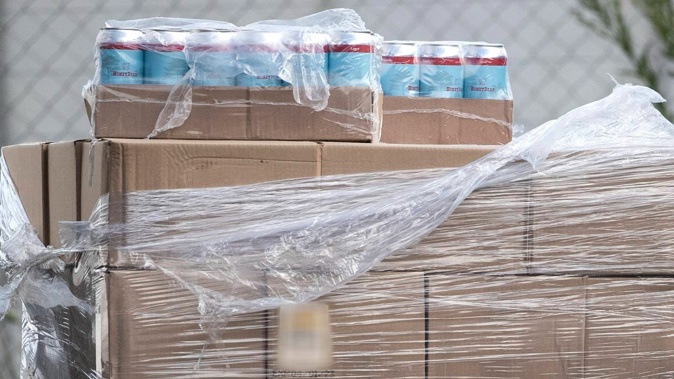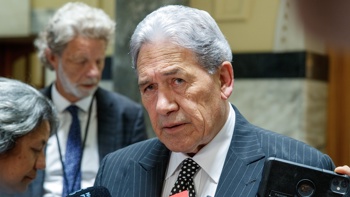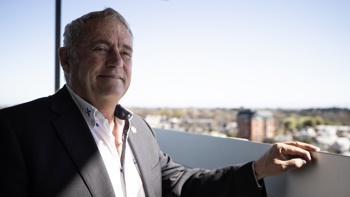
Police have seized three-quarters of a tonne of methamphetamine in a raid on a South Auckland warehouse, making it the biggest meth bust in New Zealand history.
Researchers and drug harm reduction groups say New Zealand is “at the mercy” of a growth in global meth production, threatening an “exponential increase” of harm to our communities.
The meth seizure followed a police investigation into the lacing of cans of beer with the Class A drug, which killed 24-year-old Aiden Sagala after he drank one earlier this year.
A provisional total of 747kg was seized during a search of a property on Ryan Pl in Manukau in March, part of Operation Lavender, a police spokesperson said.
“This figure comprises crystallised methamphetamine as well as methamphetamine extracted from the cans found at the address.”
A 40-year-old man has been charged with manslaughter over Sagala’s death, along with charges relating to shipping the meth-laced beer.
Another man, a 30-year-old, was arrested on March 10 at Auckland International Airport, and the 40-year-old was arrested on March 28 following a raid at another Auckland address.
A shipment of kombucha bottles was among pallets of beer cans seized by police in the raid.
In April, police confirmed they had so far identified 328kg of methamphetamine concealed in the beer shipment.
Massey University Associate Professor Chris Wilkins told the Herald, “We used to talk about tens of kilos. You know, 50 or 60kg. Now we talk about the hundreds.”
The amount of meth found in March tops the previous record bust in January this year when 713kg was seized, found concealed in maple syrup at the border. Last year, 613kg was seized at Auckland Airport.
In 2016, 501kg of meth was found on Ninety Mile Beach and another 500kg was found in Whakatane in 2019. The next biggest meth busts were a 469kg haul in 2019, and a 448kg haul in 2016.
The biggest bust of any drug was 3.2 tonnes of cocaine found floating in the ocean this year. Last year, 700kg of cocaine was discovered at the Port of Tauranga.
/cloudfront-ap-southeast-2.images.arcpublishing.com/nzme/7EBSDLSS3NDCDAVNTXHSWQM3HE.jpg)
More than 700kg of meth was seized by police during a search on Ryan Place, Manukau in March. Photo / Jason Oxenham
Wilkins said there were countries where governments were supporting organised crime.
“And they’re producing methamphetamine by the factory.
“Basically, the level of production in these parts of the world has gone up considerably. There are new countries of supply. Mexico, the Middle East, even Canada.”
Wilkins said New Zealand’s changing gang landscape was another factor behind the increasing supply here.
“You’ve got gangs that are very focused on the methamphetamine trade as a profit-driven business. They’re just reacting to the price. You’ve also got the new 501 gangs, the deportees from Australia,” he said.
“They come from Australia with ready-made international contacts through international gangs they belong to, like the Rebels. They have new contacts for supply.”
Drug Foundation chief executive Sarah Helm said news of the seizure was depressing and reiterated that we were seeing an increase in global production.
“New Zealand is a small place with a very high price on methamphetamine which leaves us very vulnerable to a big international market,” she said.
However, Helm said the Drug Foundation hadn’t seen an increase in meth consumption.
“We haven’t observed an increase in wastewater results or consumption we’re aware of, which is good news,” she said.
“The bad news for us is with this huge growth in the volume being seized. At some point a big amount will get across the line and into the community.
“And while that supply has grown, our community resilience hasn’t. Seizures are one way of dealing with it, but we also need to reduce demand.”
Helm said meth was one of the most harmful drugs circulating in the community.
The Drug Foundation had been calling for an increase in addiction support and harm reduction policies “for a while”.
“We know there’s a high correlation between people with unmet needs such as ADHD who might be untreated who might try and alleviate their health harms with methamphetamine.
“You could bring down demand [for meth] by addressing some of those unmet health needs. We’re not seeing action on these things, and these are things that might actually help to provide us with resilience,” she said.
“We need much better preparedness for a change in our global drug supply.
“This [seizure] is depressing, to be honest.”
Wilkins said meth had a “fairly high level” of addictiveness.
“Not as much as heroin, but a lot more than, say, cannabis.
“It’s also associated with mental health disorders, psychosis where too much is used - which is quite common - and it’s a stimulant, so people tend to stay awake for hours and hours - sometimes days,” he said.
“It also costs a lot of money. Meth users need to support that habit through property crime or membership of an organised crime group.”
Sagala died on March 7 in Auckland City Hospital after drinking meth-laced beer.
Police said Sagala was not involved in importing or distributing the contaminated beer “in any way”.
Auckland City’s Organised Crime Unit had been investigating the importation of Honey Bear House Beer suspected to be contaminated with methamphetamine.
A warning remains in place to not consume the product.
Detective Inspector Glenn Baldwin said while a large quantity had been seized, there was still the possibility some cans might be in circulation.
“Police do not believe this specific beer is available to be purchased in New Zealand or online,” he said.
“At this point, we have identified that part of the shipment contains liquid methamphetamine concealed inside cans, with the remainder containing beer.
“A small part of the shipment may have been given away.”
Police advise anyone who may still have Honey Bear House Beer cans to not drink them and to contact police immediately by phoning 105 and quoting the file number 230310/6793, Baldwin said.
“Consuming beer contaminated with methamphetamine may have serious or fatal medical consequences.
“We also ask anyone that might have further information regarding the product to also contact police on 105 or Crime Stoppers anonymously on 0800 555 111.”
Raphael Franks is an Auckland-based reporter who covers breaking news. He joined the Herald as a Te Rito cadet in 2022.
Akula Sharma is an Auckland-based reporter who joined the Herald in 2022. She has previously worked at the Gisborne Herald.
Take your Radio, Podcasts and Music with you









